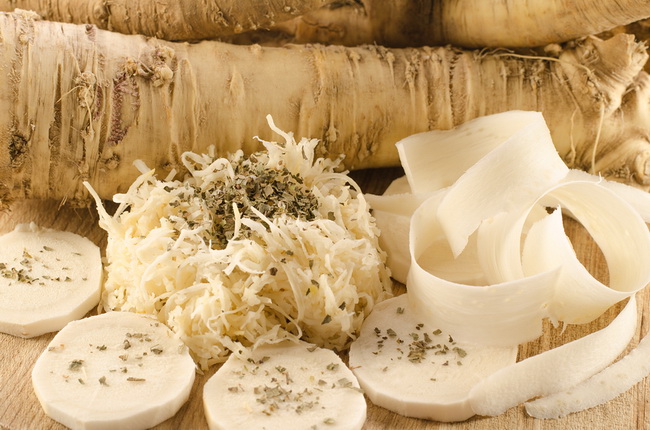- Make It Yourself Lavender Heart-Shaped Bath Bombs!
- 20 Things You Never Knew About “Down There”
- 12 Best Foods For Those Suffering From Arthritis Pain
- 12 Personal Hygiene Mistakes Almost Everyone Makes (Mom Never Told You About #4!)
- 15 Medicinal Plants And Herbs From The Cherokee People
- 12 Mind-Blowing Benefits Of Drinking Coconut Water During Pregnancy
- 12 Outstanding Winter Foods That Won’t Fatten You Up Like A Christmas Turkey
Horseradish: A Natural Antibiotic In Disguise

Photo credit: bigstock.com
You’ve probably seen it sitting on a restaurant table next to the ketchup and mustard. Horseradish is definitely an acquired taste, and most people either hate it or love it. But what many people may not be aware of is that horseradish might just be healthiest condiment in the world.
Horseradish is a plant related to wasabi, mustard, cabbage and broccoli. It has a very bold and spicy taste, too spicy to be eaten casually, and for this reason it’s more commonly used as a condiment like mustard rather than served as a side dish. The primary ingredient of the horseradish plant is its thick white roots, which, when sliced, release enzymes that break down a compound called sinigrin. This in turn triggers the release of mustard oil, which produces the pungent smell and taste that horseradish is known for.
While today, it’s commonly served as a garnish with steaks or hot dogs, ancient peoples used this sliced root as a folk remedy for all kinds of health problems. Modern scientific research has now proven that our ancestors were definitely onto something.
Here are the health benefits associated with eating horseradish:
1. Strengthening the immune system
Horseradish contains antioxidant compounds that enhance the strength of your body’s natural ability to defend against disease. These compounds trigger the body to produce more white blood cells, which are your immune system’s cellular foot soldiers that attack germs, viruses and foreign bodies. Horseradish is also a good source of vitamin C, which, as we all know, boosts the immune system even more.
2. Cancer-fighting properties
Many people would be amazed to learn that the humble condiment sitting in their fridge might reduce their chances of developing cancer. Remember that compound we mentioned earlier called sinigrin? Well, sinigrin belongs to special category of antioxidants called glucosinolates. Research has shown that this molecule has special cancer-fighting abilities. It acts as an inhibitor against the mutation of normal cells into cancerous ones.
Continue to Page 2

3. Reducing blood pressure
You’ve probably heard that eating too much salt (sodium) is a direct contributing factor to high blood pressure. But the truth is that sodium intake is only part of the picture. The amount of potassium you get from your diet plays an important role as well. Potassium helps balance the levels of sodium in your body, and keep them from getting too high. Unfortunately, most people are deficient in potassium, and this in turn contributes to the risk for higher blood pressure and an increased risk of the health problems associated with that (heart attack, stroke, etc.). It’s a good thing then that horseradish is a great source of potassium. Eating more of this spicy condiment can help lower your risk of both high blood pressure and cardiovascular disease.
4. Improved digestion
Horseradish contains a combination of different nutrients that allow it to improve your digestion. These include fiber, which helps prevent constipation, and certain phytonutrients which act as “gastric stimulants” and can help your stomach and intestines break down foods better so your body can absorb more of the nutrients.
5. Give it a whiff
The bold, intense smell associated with horseradish can be too much for some people. But if you have congested sinuses, allergies or some other mild respiratory condition, it might be just what you need to improve your symptoms. Breathe in some of the scent of horseradish and all those unique compounds can clear out a lot of the mucus blocking up your nasal passages and sinuses.
Horseradish has some side effects. As with any other food, there are potential downsides as well as benefits. Horseradish can act as a diuretic, increasing the frequency of urination. While this might be beneficial for some people, it can also put a bit of a strain on the kidneys. People with hypothyroidism may not want to eat horseradish, since the compounds in the root can exacerbate certain symptoms of that condition. The spiciness of horseradish might also make it a no-go for people with inflammatory bowel disease, ulcers or similar gastrointestinal conditions.
READ ALSO: The Unexpected Health Benefits Of Kale!
Be aware of your health, and try horseradish responsibly, as you would with anything else. But on the nutritional balance sheet, there will be far more pros than cons for most people. Try some today and over time, you may just come to love this powerful and spicy treat.
References:
































